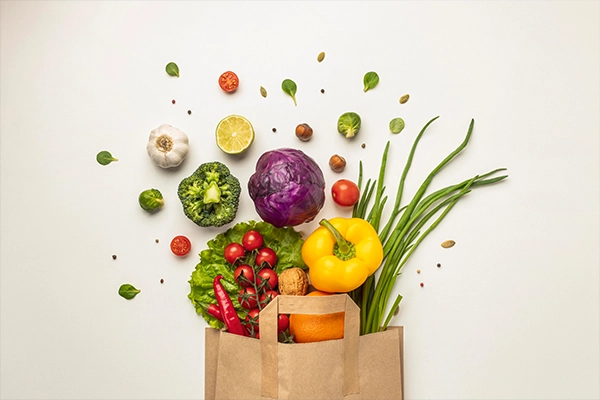Nutrition experts may have different opinions on many dietary recommendations, but they all agree on one thing: vegetables are the foundation of a healthy diet. These nutrient-rich foods are packed with vitamins, minerals, antioxidants, and fiber, all of which play a crucial role in maintaining overall health. Scientific research shows that regular vegetable consumption can help prevent chronic diseases such as obesity, type 2 diabetes, heart disease, and metabolic syndrome. However, many people still do not consume enough vegetables in their daily diets. For a great selection of fresh greens and vegetables, check out our vegetable offerings in the store and add nutritious options to your diet.
In this article, we will explore vegetables benefits in detail and explain why you should consume more of these valuable foods and how to make them an essential part of your diet.

Vegetables and Their Benefits
1.Vegetables Reduce the Risk of Heart Disease
Vegetables benefits for heart health are undeniable. Due to their beneficial compounds, vegetables can help lower blood pressure, reduce bad cholesterol (LDL), and increase good cholesterol (HDL). Leafy greens such as lettuce, spinach, Swiss chard, and mustard greens are rich in fiber, antioxidants, and potassium, which reduce inflammation and prevent blood clotting in the arteries.
A large-scale study conducted on thousands of individuals has demonstrated that regular consumption of leafy greens reduces the risk of heart disease, heart attacks, and strokes. Additionally, the natural nitrates in vegetables improve blood vessel function and increase circulation. So, if you want a healthy heart and a longer life, adding vegetables to your diet is essential.
2. Vegetables Improve Skin Health
Vegetables benefits extend beyond internal health to include noticeable effects on skin health. Many vegetables are rich in vitamin C, which aids in collagen production and prevents premature aging. Antioxidants found in vegetables neutralize free radicals, preventing wrinkles and skin blemishes.
Spinach, carrots, kale, and bell peppers are examples of vegetables high in beta-carotene, vitamin A, and vitamin E, all of which contribute to glowing and smooth skin. Some vegetables, such as cucumbers, tomatoes, and aloe vera, can even be used in natural face masks to deeply hydrate and soothe skin inflammation. Regular vegetable consumption not only keeps your skin healthy and radiant but also helps reduce acne and breakouts.
3. Vegetables Strengthen the Immune System
One of the most significant vegetables benefits is their ability to boost the immune system. These nutrient-rich foods supply the body with essential vitamins like C and A, along with iron and antioxidants that strengthen immune cells and enhance the body’s defense mechanisms against infections.
Bell peppers, broccoli, carrots, and tomatoes are among the best vegetables for boosting immunity due to their high vitamin C content. Antioxidants in vegetables also reduce inflammation in the body and speed up wound healing. Research suggests that children who consume more vegetables from an early age develop stronger immune systems in adulthood.
4. Vegetables Help Maintain Eye Health
The eyes are one of the most sensitive organs in the body, and consuming the right nutrients is essential for maintaining their health. Vegetables benefits for the eyes include protection against common conditions such as cataracts, macular degeneration, and age-related vision loss.
Carrots, spinach, kale, and pumpkin are rich sources of beta-carotene, lutein, and zeaxanthin, which help protect the eyes from the harmful effects of UV rays. Studies have shown that individuals with a vegetable-rich diet are less likely to experience vision problems as they age.
5. Vegetables Improve Digestive Health
One of the top vegetables benefits is their positive impact on digestive health. Vegetables are high in dietary fiber, which promotes healthy bowel movements and prevents constipation.
Cabbage, celery, carrots, and cucumbers enhance digestion by supporting the growth of beneficial gut bacteria. Additionally, the fiber in vegetables reduces the risk of digestive disorders such as irritable bowel syndrome (IBS) and Crohn’s disease.
6. Vegetables Boost Brain Function
Vegetables benefits extend to cognitive health, including memory enhancement, increased focus, and a reduced risk of dementia. Spinach, broccoli, and kale contain high amounts of vitamin K, folate, and antioxidants essential for brain health.
Studies indicate that individuals who regularly consume vegetables experience stronger memory retention and less cognitive decline as they age. These vegetables also reduce oxidative stress in the brain, helping to prevent diseases like Alzheimer’s.
7. Vegetables Aid in Weight Loss
One of the most crucial vegetables benefits is their role in weight loss and appetite control. These low-calorie, high-fiber foods provide long-lasting satiety, reducing overeating. The fiber in vegetables slows digestion, ensuring gradual blood sugar elevation and preventing sudden hunger cravings.
Moreover, due to their high volume, vegetables fill the stomach without adding extra calories. Eating a plate of salad before meals can reduce food intake, supporting effective weight loss.
Lettuce, cucumbers, bell peppers, and broccoli are among the best choices for weight loss. They boost metabolism and enhance fat burning naturally. Additionally, vegetables such as zucchini, asparagus, and spinach help reduce fat absorption in the body and prevent weight gain.

8. Vegetables Reduce Stress and Anxiety
Vegetables benefits go beyond physical health, playing a vital role in reducing stress and improving mood. Nutrients in vegetables help regulate stress and happiness hormones, promoting relaxation and emotional balance.
Leafy greens such as spinach and avocado are excellent sources of folate, a vitamin essential for serotonin and dopamine production. These hormones play a key role in mood regulation and preventing anxiety and depression.
9. Vegetables Prevent Bloating
Bloating is a common issue many people experience. Vegetables benefits in this regard are significant, as some have natural diuretic properties that reduce fluid retention and prevent bloating.
Leafy greens like parsley, celery, and cucumbers are high in potassium and water, which help balance electrolytes and reduce swelling. Fiber in vegetables also aids digestion and prevents gas buildup.
10. Vegetables Slow Down Premature Aging
One of the most remarkable vegetables benefits is their ability to slow down premature aging and maintain youthful skin. Vegetables are packed with antioxidants such as vitamin C, vitamin A, and beta-carotene, which combat free radicals and protect cells from damage.
Leafy greens like kale, spinach, and bell peppers contain high amounts of vitamin K, improving blood circulation in the skin and enhancing its radiance. Additionally, cucumbers and tomatoes are hydrating and prevent dryness and cracking.
Conclusion
This article comprehensively covered vegetables benefits and their positive impact on health, weight loss, digestive function, stress reduction, and energy levels. However, many people still do not consume enough vegetables in their daily diets, leading to an increased risk of heart disease, diabetes, obesity, and even skin problems.
The best way to improve dietary habits is through education from an early age and ensuring access to fresh, high-quality vegetables. Buying fresh and organic vegetables is essential for getting the necessary nutrients. In this regard, supermarkets and hypermarkets offering fresh vegetables can play a vital role in increasing their consumption.
If you’re looking for fresh, high-quality, and healthy vegetables to maintain your well-being, visit Faraz Hypermarket. At Faraz Hypermarket, a variety of fresh, organic vegetables are easily accessible at reasonable prices. By purchasing from Faraz Hypermarket, you can always be assured of the quality of your vegetables and incorporate them into your daily diet for a healthier and more vibrant life.










